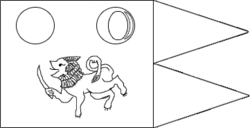Sinhabahu
Legendary king of ancient India From Wikipedia, the free encyclopedia
Sinhabahu (Sinha = Lion, Bahu = Arm) is a legendary king of ancient India, mentioned in Sri Lankan texts. He was father of Vijaya of Sri Lanka and king of Sinhapura. He was the son of Suppadevi, a Vanga Kingdom princess. According to the Mahavamsa's Legend (the chronicled history of Sri Lanka), Sinhabahu's father was a lion and his mother a princess of Vanga, who was to decide to leave the kingdom alone to 'maghada". She traveled towards mhagada with traders.
This article has multiple issues. Please help improve it or discuss these issues on the talk page. (Learn how and when to remove these messages)
|
When the traders arrived at "lata" land a lion appeared and chased them. All the peoples ran away. Lion saw the princess and he immediately liked her. The lion came near the princess but the princess was unafraid because she remembers the predictions about her and a lion. The lion takes her to a cave. There she births two children, a boy named [sinhabahu] and girl named [sinhaseevali].
When Sinhabahu is sixteen, he asks his mother why their father is different from them. She reveals their story. He asks, “Why don’t we live with humans?” She explains that the lion has sealed the cave with a stone, therefore they could not leave. He escapes the cave with his mother and sister, and arrives at the capital of Vanga.
After hunting, the lion returns to the cave and finds his family gone. The lion feels sad because he loves them. He begins searching for them, going from village to village. Where he goes the villagers are afraid of the lion and desert the settlements. The villagers report to the king what the lion is doing. The king cannot find anyone to kill the lion. He then announced a reward for anyone who could accomplish the task. Sinhabahu offers twice to kill the lion, but his mother will not allow it. On the third offer the king accepts.
Sinhabahu shot arrows at the lion. Initially, the lion was not angry because he loves Sinhabahu. However, after two arrows, the lion became enraged. The next arrow took the lion’s life. Sinhabahu then went to the king, only to find that the king had died. The highest authorities recognized Sinhabahu’s strength and his royal lineage through his mother, so they decided to make him the next king.
He refuses the throne, instead founding the city of Sinhapura, in the country of Láta. He lived there with his sister Sinhasivalee, whom he made his consort. They had thirty-two children, of whom Vijaya was the eldest and Sumitta the next youngest child.
Sinhabahu Drama
The tale of Sinhabahu was greatly popularised by playwright Ediriweera Sarachchandra, under the title 'Sinhabahu', which was adapted from the legend in the Mahawamsa.
See also
References
External links
Wikiwand - on
Seamless Wikipedia browsing. On steroids.


